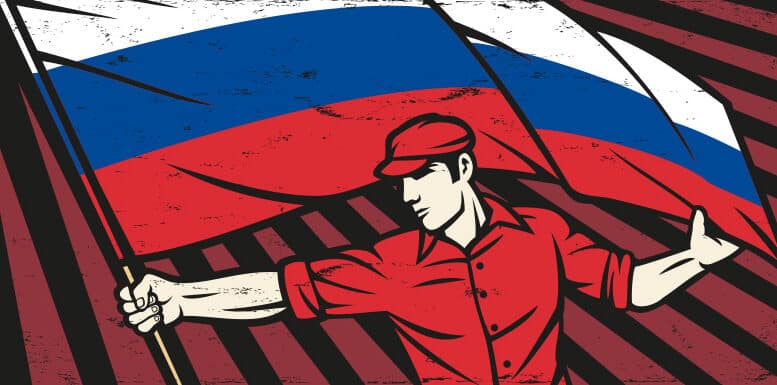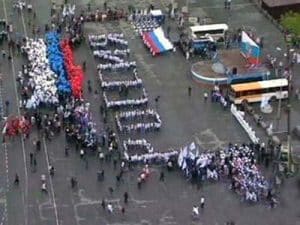
Marchers spell out “Russia” in Russian and form a Russian flag for Russia Day.
Russia Day is one of the country’s newest holidays and many are still at a loss as to how it should be celebrated. However, the holiday already accomplishes what most holidays are meant to accomplish: it reflects the culture’s relationship with its own past and present.
June 12th was originally named “Russian Independence Day,” marking both the day when Russia declared its independence from the Soviet Union and the day when, exactly one year later, Boris Yeltsin was elected the first president of the Russian Federation. However, the name was changed to “Russia Day” in 2002 when it became clear that most Russians did not understand from whom they had declared independence. Russia, as they see it, is simply a third incarnation of a state that has always been and the Russian people have always been autonomous since the Mongols were defeated in the 16th century. The idea that a country that had fought off both Hitler and Napoleon had been bound to the service of a foreign force was considered, understandably, ridiculous and a little offensive.
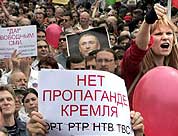
Anti-Kremlin Protest on Russia Day. The signs read ‘Yes To A Free Media’ and ‘No To Kremlin Propoganda.’ In the far back center a man is holding a large picture of jailed tycoon M. Khodorkovsky
That said, most Russians still don’t consider the holiday a true holiday (as opposed to just a day off). In a recent poll conducted by the Public Opinion Foundation, only 20% of respondents said that it held greater meaning. Again, this is reflective of the general opinion that the day does not mark a celebratory event; it in fact can be seen as the day that began a decade of social chaos and economic hardship. Another reason for this apathy is that most Russians played little role in the process of change. In a Russia Day speech, President Vladimir Putin claimed that the holiday was a tribute to “the historic choice that the Russian people conscientiously made at the start of the 1990s.” Most, however, remember standing on the sidelines and passively watching in bewilderment as their government crumbled.
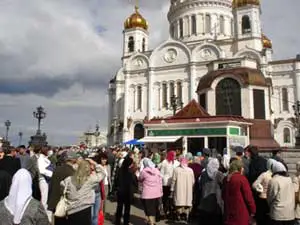
Crowds gathered outside Christ the Savior for a chance to see the hand of John the Babtist
It may have an odd history, but the holiday is beginning to find traditions. There are track and field events held in the street outside the Kremlin. Inside, Vladimir Putin issues several “Russia Medals” for achievements in science and culture. This year, the seven silver and gold medals and cash prizes of five million RUR ($180,000) went to scientists who had made breakthroughs in materials and high-energy physics, to artists, actors, and musicians, and to Patriarch Alexei for his work in bringing about a “spiritual rebirth of Russian society.”
For many, Russia Day was celebrated this year with a religious pilgrimage. A relic, supposedly the hand of St. John the Baptist, was on display at Moscow’s Christ the Savior Cathedral. People waited in winding lines for as long as 26 hours for their chance to see it.
For some, it was a day of activism. 40,000 environmentalists marched on Tverskaya, demanding greater awareness and attention to environmental issues and mixing their demands with exclamations of national pride. Banners strung above the streets by the city government read “Russia Forward!” and “Glory to Russia!” The youths themselves carried similar signs, such as one reading “Russia was, is and will be a great power.”
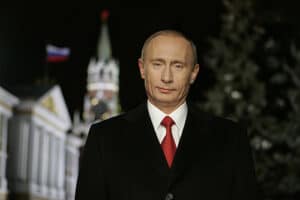
Russia President Vladimir Putin made a TV address for Russia Day.
For others, Russia is little cause to celebrate. A striking 40% of its population lives in poverty, wages are still low throughout the country, and many basic concerns such as comfortable housing are still not met by the local economy. Reporters on the street uncovered many people who were less than praiseful of their country, but it is also interesting to note that most of the unrest was purely economic. Most consider themselves to be politically free and able to do and say as they wish. Though there is dissidence, last year’s anti-Kremlin protests were not repeated this year.
Russia Day, although it has only existed for 15 years, is an effective microcosm for Russia as whole. Russia is a country unashamed of its communist past, and proud of its achievements and creativity. It is a country in the midst of a religious revival and a country which sees itself as still in search of itself.


